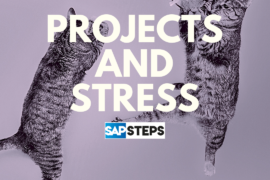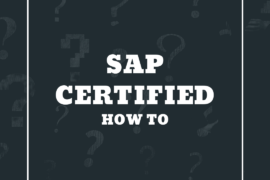When I started thinking about starting a career in the SAP world, I didn’t know anyone in the field.
I even knew some people in the SAP market (my cousin was a project manager and a friend of mine works in a more technical area), but as both options didn’t appeal to me, I felt pretty lost in knowing how to get started.
I believe that this is a very difficult time for anyone who wants to start in such a large and complex world.
This post’s main purpose is to explain what are the main career options in the SAP world.
Hope you like it.
1 – Functional Consultant
I will start talking about the SAP area in which I most identify myself, mainly because I belong to this group myself.
The main role of a functional consultant is to act in the definition and configuration of processes within SAP.
What do I mean by this?
Let’s assume that you become a functional consultant in the field of Supply Chain (my case).
The project begins and you are introduced to all your Key Users (users of each area by the client) and you begin to discuss all the processes that they have today.
For example:
- Service Purchases
- Raw Material Purchases
- Shopping for office supplies
- Annual Inventory
- Stock Transfer
- Import of Raw Material
- Etc
After knowing the list of the main processes, you still decide to start with the service purchase process.
You find out what types of services the company buys, who are the main suppliers, and what taxes are imposed on those purchases.
Also, you discover that there is a strategy for approving purchase orders (for any order).
Depending on the total value of the order, certain people need to approve it.
Once you have all the details, you will be responsible for creating a document specifying this approval strategy.
With the created document, it is approved by the customer, the configuration is performed by you in the system, the tests are carried out and ready.
Simplistically, you, as a functional consultant, will do this work for all the processes identified in the project.
I would say that this will be your main function.
Also, you, as a functional consultant, will work in the following activities:
- Process flow design
- Discussion of accounting, costs, etc. (Depends on the module)
- Testing
- Creation of functional specifications (document with details on the proposed
- solution)
- Data load
- Creation of training material
- Teach users (through training)
- Participation in several meetings
- Among many other activities.
You will also have to choose which functional module you want to work on.
The ideal is that you have some familiarity with the processes of the chosen module, as it will be much easier for you to perform your functions as a consultant (it was not my case when I joined SAP I came from a more technical area and knew absolutely nothing Supply Chain processes).
Here is a list of the main SAP modules:
- SD Module (Responsible for sales and distribution)
- MM Module (Responsible for materials and purchasing management)
- FI Module (Responsible for accounting)
- CO Module (Responsible for costs)
- WM module (Responsible for warehouse management)
- PP Module (Responsible for production processes)
- QM Module (Responsible for managing quality processes)
In addition to these modules, there are countless others, but in my opinion, these are the modules where most of the opportunities are found today (mainly SD, MM, FI, and CO).
It is important to note that some personal characteristics and knowledge can make your life as a functional consultant much easier.
- Speak English and other languages.
- Being communicative (I was very shy when I started)
- To be organized
- Coping well with pressure and deadlines
Knowing how to work well within a team (essential)
These characteristics are very important, but if you do not have them, nothing prevents you from developing them during your career.
One last detail: initially it is important to become a specialist in a single SAP module, but over time y
2 – BASIS Consultant
Another option for the SAP career is the Basis module.
This module is responsible for the structural part of SAP, that is, the installation of the system, database, etc.
Also, the Basis consultant is responsible for various activities related to the SAP environment, such as backups, specific configurations, etc.
In terms of career, it is not a module that I would recommend, as job opportunities are reduced (not many consultants are needed for this module in each project – unlike technical or functional consultants).
3- Technical Consultant
An extremely important area within the healthy world is technical consultancy.
A technical consultant is a consultant responsible for programming activities (Abap Module), Integration (PI Module), or other more technical activities.
These consultants are very important in all projects, as it is practically impossible to implement or improve an SAP system and not have the support of both.
SAP is an extremely complete system, with many processes practically ready.
But each client always has their specific needs, and for this reason, the ABAP consultant will be responsible for creating all the necessary programs so that that particular process works exactly as requested by the client.
Also, practically all companies need to integrate systems external to SAP and for that, an integration consultant is always necessary (PI Consultant).
These two types of consultants are not the only ones in the more technical part of SAP, but I would say that they are the main ones (ABAP being highly requested in all projects).
If you already have a more technical background (be a programmer), becoming a technical consultant can be a great option.
There are many job opportunities.
4 – Project Manager
There is no SAP project without a project manager.
He is an extremely important figure and is often instrumental in the success or failure of an SAP project.
I’ve had great experiences and also bad experiences.
An SAP project is always challenging. Projects are expensive, resources difficult to find, and schedules always challenging.
This is exactly the great challenge of an SAP project manager: Balancing Costs + Team + Deadlines.
Not an easy task.
In addition to balancing these three pillars, the project manager is responsible for presenting the project’s progress to all stakeholders.
He/she needs to motivate the team, estimate the effort of the activities, and be the bridge between the consultancy and the final client.
It is very common to have more than one manager in each project (one on the consulting side and one on the client-side).
Thinking in terms of the job market, there are great opportunities for good SAP project managers, being very important for this professional to have the characteristics below:
- Project management concepts (not specific to SAP)
- Implementation methodologies for SAP projects
- Speak at least English
- Communication
- Organization
- Leadership
- Ability to motivate the team
- Transparency
- Great knowledge to prepare presentations and present them
- Etc
It is a great option as an SAP career.
Important point
In addition to choosing which of the above options you want to act on, it is also important to decide whether you want to work in consultancies or directly at the client.
Both choices have their advantages and disadvantages, but, in my view, working at least for a while in a consultancy is very interesting, due to the experience to be gained.
I know many consultants who, after a long period of consulting (working in the most diverse clients and different business branches), decided to go to a specific company and are very happy.
It is a personal option, but experiencing many business areas will be very interesting in the long run for any SAP professional.
Conclusion
I hope this post has clarified SAP career options.
If you liked this post, be sure to subscribe to our newsletter to receive first hand the next posts.
If you have any suggestions (including subjects you would like to read about), feel free to send an email to sapsteps@sapsteps.com.
A big hug,
Bruno César



